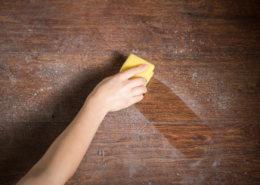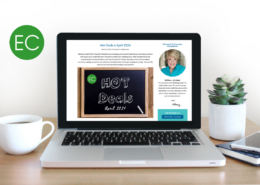Mistakes Teach Us What Doesn’t Work
Have you made any mistakes lately? Want to talk about it? Most people don’t. Can’t say that I blame them. It’s embarrassing. And when it’s a really dumb mistake, well that’s something you hope to never have to think about again. And that’s a mistake.
Mistakes are useful because they teach us what doesn’t work. But making the same mistake over and over again while expecting different results—well, that’s one definition of insanity. There’s tremendous value in learning from our mistakes.
I’ve accumulated a list of mistakes over many years. It’s like a trophy now—a specific compilation of things that I do not have to do again because I’ve proven they do not work.
Walking into a supermarket without a plan
Walking into the grocery store (or Costco) without a plan—a written list and cash—is a terrible mistake. I know me. Without a conscious decision to stick to it, I am a $200 mistake just waiting to happen. And if I’m really hungry? Make that $300.
Buying extended warranties on appliances
Statistically, if an appliance is going to fail it will do so in the first 90 days (the product comes with a warranty to cover this time frame) or after five years (extended warranties aren’t that extended). It’s a good exercise to figure out the total cost of an extended warranty, then consider forgoing it in favor of putting that same amount into your savings account instead of the insurer’s pocket. Chances are very good that at the end of the period warranty period, you’ll have a working appliance and a nice nest egg for yourself. For the record, a laptop computer is my personal exception to this mistake. Laptops fail routinely, trust me.
Leasing a car
And it really doesn’t work to roll the shortfall and extra charges at the end of one auto lease into a new auto lease. To have repeated this mistake over and again for no fewer than 22 years straight (yes, me in my dark financial past) was to come dangerously close to insanity.
Buying a 7,000-gallon blow-up swimming pool
Actually, I didn’t know such a thing existed so I can’t even argue it was something we needed. Standing there in the middle of the Home Show I managed to pull off the impulse purchase of the century (thankfully, this was in the last century). That was a mistake that just kept on giving lessons to be learned until the day several years later we begged Goodwill to just take it away. Please.
Carrying more than $100 cash
Carrying a single $100 bill I keep tucked into a secret place in my wallet is for me a great deterrent for overspending. I don’t feel broke, but it’s a bill I hate to break. It is also the tipping point. Carrying around more than $100 (unless it is for a specific and immediate purchase) creates a feeling of excess that burns a hole in my wallet. The overage simply disappears. That’s a lesson I needed to learn and re-learn. Oh, the insanity.
Paying for Christmas with credit
When it comes to mistakes, depending on credit to bridge the gap between what you earn and what you spend is a big one. Debt is a terrible liar, insisting that while you don’t have the money today, you’ll have it next month. Or the next. Debt keeps you stuck in the past, always stealing from the future.
Regularly eating in restaurants
Great fortunes are often lost one dollar at a time. It may not seem like a big deal when you pick up that double cappuccino, grab breakfast on your way into the office, or eat dinner out because you’ve had (another) busy day but every little item adds up. Just $25 per week spent on fast food costs you $1,300 per year, which could go to building your emergency fund, beating down your student loan debt, an extra mortgage payment, or a number of extra car payments.
Using home equity like a piggy bank
Your home is your castle. Refinancing and taking cash out means giving away ownership to someone else. It also costs you thousands of dollars in interest and fees. Smart homeowners build equity so they don’t end up making in perpetuity. The goal is to reach 100% equity—you own it free and clear! If you keep spending the equity through home equity loans (HEL) or home equity lines of credit (HELOC) you’ll never get there, you’ll end up paying way more for your home than it’s worth, which all but guarantees you won’t come out on top when you decide to sell.
My husband and I spent years seeing our home’s meager equity as some kind of ATM. But we learned from that mistake. After years of hard work plus and benefiting from home appreciation we own our home free and clear—no mortgage ever again.
Living paycheck to paycheck
We hear it a lot, “paycheck to paycheck” but what does it mean really? I’ll tell you: Living with no cushion, no savings account, no budget, and no plan—getting paid on Friday, seeing it all but gone by Monday, then white-knuckling by living on credit cards and avoiding creditors until Friday when you get paid and it starts all over again. It’s an awful way to live.
Using retirement savings to pay off debt
You may be thinking that if your debt is costing 19% and your retirement account is making 7%, swapping the retirement for the debt means you will be pocketing the difference. But it’s not that simple. In addition to losing the power of compounding, it’s very hard to pay back those retirement funds, and you could be hit with hefty fees. With the right mindset, borrowing from your retirement account can be a viable option, but even the most disciplined borrowers have a tough time coming up with the money to rebuild these accounts. When the debt gets paid off, the urgency to pay it back usually goes away. It will be very tempting to continue spending at the same pace, which means you’ll fall back into debt again, needing to borrow yet again from that 401(k) to get caught up, and on and on it goes. If you are going to pay off debt with savings, you have to live like you still have a debt to pay—but now it’s to your retirement fund.
Debt is reversible, thankfully—provided you don’t do it over and over expecting that eventually, somehow you will get different results.
That would be insane.
Question: What was the best lesson you ever learned from a financial mistake? If you feel comfortable, share it in the comments area below.















One of my mistakes was in paying off debt the WRONG way. I started paying on a loan we had on our house making a regular payment and then adding a principal only payment. Where I was wrong, was this debt only had a 3.75% interest. I had a debt on a heat pump (heating and cooling our house) with a 10% interest and another on a credit card at 19% interest. When I finally came to my senses I changed my payments to paying off the credit card and the heat pump first and then went back to making those payments on my house as added principal. The loan on my house was for 20 years and I will now have it payed off in 5 years.
Excellent strategy, Sandra. Great job on learning from that mistake. I’m sure it’s a lesson you will never have to learn again!
I copy my grocery list from KrogerKrazy and print it out. I note what coupons are on my card and dig out the paper coupons and put them in an envelope (reused bill envelope) and I note ibotta or fetch rebates. I will write down other items that I need that don’t have coupons like milk etc on the list. I don’t usually get more than what is on my list unless I see an awesome deal. I get a lot of food that was free after coupons and I share with my neighbors or donate them to food banks. Got free formula and baby food once and paid $1.50 for diapers once just to donate them. I believe in giving back when I can afford to. I just bought 15 6 packs of water and only paid tax for them. Sharing with friends and neighbors and keeping some for myself. We use them when we travel a lot. We don’t usually buy bottled water but it was free and can be used. We make our own flavored water with fruits and veggies or make tea or coffee most of the time. I also send off for all free coupons that come in the mail and we use them or donate them…. I found out that I don’t like gluten free bread but still had some free coupons so gave them to a neighbor.
I buy uses appliances. The Restore outlet guarantees them for 90 days but we have never had a problem with them. Older appliances are made to last not be replaced in a 2-3 years. I had a dryer go out (it was bought new) and when it went out in 1 year I was told that dryers were not meant to last forever. That was the last time I bought new. I paid $35 for my next dryer and so far it has lasted 4 years and it is from the 80s. LOL My washer went out last year but my brother googled it and he fixed it with the help of a man at the appliance parts store. It cost $60 but was worth it. Repairing older appliances is easy as there are no computers in them.
Worst mistake? Buying a timeshare — twice! And we only used it once!
My husband and I shared a checking account for 15 years and could not keep track of the spending. He insisted we had to use one together, and countless overdraft and other fees later, I put my foot down and insisted we each have our own spending accounts with a joint account for bills and household spending. Not one overdraft fee since! You have to find what works, NOT what you HOPE will work!